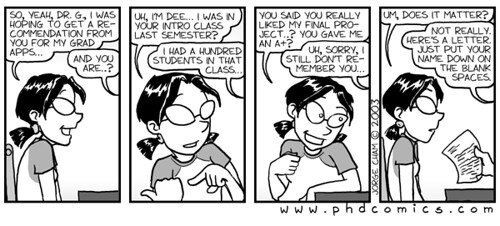I saw a man with a beard, bicycle, with a sign in front saying "MIND CONTROL = FASCIST Neurology, and a sign behind which gave figures in the scope of the problem. Ever since I was little (when I reflected on what had terrified the complicated lives of the great) I bring the latent fear of not being able to exceed the minimum requirement for inclusion in society '. Not that I think about it constantly, but I always think back with a shudder when crossing a street person, or a crackpot as the gentleman above. I always feel that way for me especially around the corner (and for that I am always careful to put aside the most 'of what can' I earn, to have some margin year eventually will come when 'the failure).
And with the series of posts last week inaugurated
explain some things that help feed my latent fear.

My brother is searched every six months is looking for a check from CNRS. Simone Weil, quoted by André Weil (the brother of the above) through years of apprenticeship (quoted by
restodelmondo )
to emigrate
In reality 'I had originally planned to speak at this episode, what happens in competitions in Italy, but given the previous comments to the post exchange policy between this and the next episode, the first to describe the differences between Italy and the main foreign countries.
The system of research and 'must be very international, so over the years and' got a great convergence in the ways of employment in most countries in scientific activity, with the notable exceptions of Italy and France (the latter will talk 'shortly after) that have systems based on principles that are radically different, probably of Napoleon. The German system does not know anything, and if any commentator (I have already 'got a couple) will provide some tips, linker' remarks willingly.
 [Update: said than done.] These modes' are pero 'uniforms in the same field, and can be extremely different from one field to another (for example, theoretical physicists and' practice questions that people sent to work towards the end of the calendar year, and that service will take about a year later, in my field's
[Update: said than done.] These modes' are pero 'uniforms in the same field, and can be extremely different from one field to another (for example, theoretical physicists and' practice questions that people sent to work towards the end of the calendar year, and that service will take about a year later, in my field's openings, that 'the job, can quit at any time, to take up even a week after acceptance). Here I will talk about 'only mine.
First, it must be said that the Italians (and French) are considered anomalous because of their tendency to fixity media '. The career of a typical Italian and 'vertical, if any right' to any university 'Italian questioned the professors, I would bet that you will find that most universities have graduated in the same 'they teach.
This attitude (which I have myself) and 'fiercely criticized in the Anglo-Saxon and Nordic countries (and in general in all countries that have adopted the Anglo-Saxon model), where is' considered a sign of prestige to the institution to constantly change and possibly the nation.
I personally strongly against this mentality 'that rewards nomadism (for various reasons quite obvious that I think - just think of the age' "post-doctoral 'and' even the old age 'in which people normally bring up a family) finding greatly improved the Italian model. Therefore always remain a bit 'surprised (and annoyed) when I find that for many colleagues, including Italian ones, to travel around the world and the 'even one of the benefits of this career.
However, the mentality 'evolve relatively quickly to changing circumstances: when I was a student, the role model I had available were people perfectly framed in the traditional vertical career (after graduating doctoral universities in the same', then a few years precarious with scholarships or contrattini the pretext funny, waiting for the competition especially for them) and who was hardly ever emigrated between
 very good: with the exception of the persons mentioned above (ie 'those who change the country LIKE) migrated the Bravini , that 'those sufficiently good to win without any problems or even permanent positions abroad scholarships, but not good enough to convince their leaders Italians to invest in them (*). Since the conditions have deteriorated suddenly in Italy (not only in research but I think that what is ultimately attributable to an overall deterioration of the Italian situation, as demonstrated by the level of insecurity and despair of my peers in general) , those who enroll in certain faculties, 'traditionally-oriented research, sees his role model in trouble' and more and more 'often migrants, and is' therefore more 'likely to enter into an order of ideas in which this and' the normality '. Between when a student enrolls, and when he graduated, has had time to receive the message that doing research is very often emigrate, while those of the transitional generation which I belong was a shock.
very good: with the exception of the persons mentioned above (ie 'those who change the country LIKE) migrated the Bravini , that 'those sufficiently good to win without any problems or even permanent positions abroad scholarships, but not good enough to convince their leaders Italians to invest in them (*). Since the conditions have deteriorated suddenly in Italy (not only in research but I think that what is ultimately attributable to an overall deterioration of the Italian situation, as demonstrated by the level of insecurity and despair of my peers in general) , those who enroll in certain faculties, 'traditionally-oriented research, sees his role model in trouble' and more and more 'often migrants, and is' therefore more 'likely to enter into an order of ideas in which this and' the normality '. Between when a student enrolls, and when he graduated, has had time to receive the message that doing research is very often emigrate, while those of the transitional generation which I belong was a shock. But how does all 'foreign
? (From here on, this word implies that majority of scientifically advanced countries that have adopted a system similar to the Anglo-Saxon.)
The fixed place usually gets you around 35 years, with variability 'between 30 and 40. So, until a decade ago, Italy was known as a country with rapid career (such as France still is), but there is' a but. In Italy and France, which have a whole society 'based on traditional fixed position, the first step of a fixed career (In Italy, in the universe 'called
 Researcher ) and' always been considered a place with low manpower, paid little and with zero power. Elsewhere, the fixed position and instead 'something very prestigious, and usually brings with it' the opportunity 'to form his own research group (students becoming responsible, and in some cases with a small budget to banish post-doc fellowships, see below). This is because 'the first of a permanent job there' step of the post-doc
Researcher ) and' always been considered a place with low manpower, paid little and with zero power. Elsewhere, the fixed position and instead 'something very prestigious, and usually brings with it' the opportunity 'to form his own research group (students becoming responsible, and in some cases with a small budget to banish post-doc fellowships, see below). This is because 'the first of a permanent job there' step of the post-doc , which in turn has a more prestigious Italian equivalent (l ' Research Fellowship, which in turn is a' introduced quite recently, motivated by lengthening the periods of insecurity among the Ph.D. and the fixed place, and whose prestige and Italy in the same 'ALMOST' nil). The standard period for a post-doc 'two years, more' rarely three, and is' very rare (and unpopular) that remains in the same place for two consecutive post-doc. If you're good would be in the interests of your employer hold you, of course, but apparently it is then regarded as a dark stain on your resume (ie: why 'and' left them '? Has not received better offers elsewhere?), Then should do so only if there is' a leap in quality 'between the first and second contract (or, if the first and' a normal post-doc, the second as a minimum should be a title rather than 'high-sounding, ancorche' too precarious 'it). Mode ' recruitment of post-doc: oddly, the only major element of variability 'and' the existence or not of '
interview, that' the interview. Incredible though it may seem, very often you can 'be taken to work two years in a place without even an interview. The reason why in spite of everything it seems to work and 'which' still practices by employers (which there is or is not the interview) do private investigations, calling here and there 'to know what you think of the people various candidates. (This leads to reward visibility ', or make presentations as much' as often as possible in international meetings and conferences, even when there's nothing really new to present, while the Italian system, where your career depends only on an opinion that you have a single person, and that 'your godfather, it leads people to feel it as very important, and how, if anything, leads to pathological behavior ass-licker. For example, to a precarious and Italian 'rational behavior do exercises for the free course of his teacher, even if it is not' paid and not 'even officially recognized by the University' and therefore can not 'not even write it in the curriculum, while for a post-doc and foreign 'unthinkable to education - even if officially recognized - because' subtracts precious hours to research, and that 'the only activity' which gives 'visibility'.)
When you request for a post-doc things more 'important are the curriculum and
letters .

The difference with the private world 'that the synthetic CV, bullet after bullet only the essential info, are not appreciated. Every time I read my CV to someone for advice, and I 'always been advised to be more' detailed, more 'bombastic, more' unnecessary. My current CV and '10 pages (and decency I used a small font) and not' between the more 'long. The difference
with the world competitions in Italy and 'in Italy, especially, the CVs are useless, and then no one loses too much time. Or rather, there 's one thing you need: outline to the committee about what' you have skills. Therefore, since the commissioners have an interest in demolishing the candidates who do not want to win and make it appear that they are undeserving of the ignorant, they use the information to understand what's CV certainly not
six competent, and then on which you insist on questions detail (there will be the first paradox that you should list everything on your CV because 'part of the evaluation, the other provides the tools for your own downfall.) But we will talk 'with more' details in the next episode.

letters of recommendation, it seems, are very important. In each call abroad for post-doc who fixed place (but also for graduate admission), requiring a certain number of letters of recommendation, ranging between one and three (but is usually 'allowed mail it most 'of the number specified in the notice).
A letter of recommendation and 'written by someone with whom you worked that testifies to meet and have a great esteem.
Or rather, could also speak ill of you, and so theoretically the letter and 'secret and the candidate is not' entitled to know the content. The Italian professors usually but 'they have no problem to read it the person for whom they are writing (usually to show him what they're praising, sometimes there is' a practical reason: they do not remember exactly what he has done, and then they want to avoid revealing gaffe in praise for doing it , and I 'happened to dictate a paragraph of one of my letters of recommendation idem ...), and also some foreigners. But it can 'happen that some of the letters speak ill of the candidate! It 's very rare (and is' very concerned by assholes, of course: the proper way to behave in accordance with the rules agreed upon by the community', and 'say that you prefer not to write the letter), but I know of two cases in which this certificate' and 'captain, who of course are passed down orally from generation to generation.
One of the reasons why a professor can 'speak ill of a candidate in a letter that ideally should help him and' who actually despise (unbeknownst to him) and believes it is good for the community 'science that its scarcity, not necessarily evident from the curriculum, is known to all. Another reason may 'be that same opening
have asked for more' people who asked him the letter, and he has clear ideas about who deserves more, and then face a different standard letters to communicate to the Selection Committee his personal order of merit. seems, but I have no direct experience, that the German system in practice is that for most candidates' laudable specifying the defects
[Update: Delio denies] . Hence the story that Pauli, in writing the recommendation letter for his brilliant former student (different versions of the same story provides a different name to the former student) who made application to Princeton, to work with Einstein, he ended with " his only fault, and 'that tends to lose sight of the physical sense of the abstraction for mathematics - but I do not think that she is a big problem, Prof. Einstein. " Still, the German professors have a reputation for writing letters little too enthusiastic for the best.
The Italian professors instead sbracano systematically for any candidate, but are internationally well known for this and the selectors will take account.
Americans are enormously sbracano only for the best. And I'm known for something that all Europeans are universally disgusting: in the letter of recommendation for a candidate, they usually make direct comparisons (in favor) between the candidate and other colleagues of the same environment and same age group '( therefore potential direct competitors, or people who have recently won a prestigious post similar or greater).
The letter is evaluated based on content matters a lot but of course the importance of who wrote it. So every time you apply for a place, you lose a lot 'of time and mental well-being to explore all the options: should ask the mega-professorone important that you chilly is a letter (or worse yet is also to some other candidate and makes it more 'enthusiastic that to you) or the less known, however, that' we know best, we estimate more ', he might have more' complicity 'with you ?
not 'never an easy choice, but there' s also another factor: e 'mathematical anyone tell you' yes ', I make the point, there is no' problem, give me the address to send " will forget it '. As I love you, you'll have to remind her.
There is no 'clearly a problem when you're in close contact with the person to whom you asked the letter, apart from cases where it becomes impossible to find without saying when it will come back', but it gets pretty ugly when you're not, and this person and 'very important and, like all important people, and' too busy.
(I especially have serious problems to ask for favors, even outside of this area, as well as serious problems to remind people that I had been promised something. The tension of the approaching deadline and my letters of recommendation that do not start despite a couple of reminders and 'between the stations of my precarious way of the cross, one that most' will remember 'with horror when the nightmare will' eventually finished.)
Once I applied for a permanent position, again ask for the logic of the letter to someone important but who knows my work and I certainly respect, I thought asking a colleague (foreigner) that I had noticed for some time he became professor. I asked via email, and he said after a while '(was thinking about it a lot) saying that he was very honored the request and there was no problem for him, but he wanted to be fair to say that he was applying for the same post , and was short for me to decide if it was a problem for me since we were in competition.
It turned out that the short title of Professor in pompously had begun to bear on every occasion in which it was decent it was, in reality, 'a place adjunct professor. 'S largest that I am, but still a precarious.
lollosa the digression. (Ne 'I do' him we were minimally considered for the job.)
When there 'the interview (for permanent positions there' always), it focuses on its activities' of past research and on what ought to be done in the future. What will seem 'obvious to those working in private, but it' s always surprising for those coming from the world of Italian research. In fact, Italy
competitions (for the research position in the case of two papers and an oral or written, practical test in the laboratory, oral) relate to the basic knowledge of the candidate, the more 'dedicated to the description of the oral part of its Research in progress (but 'should be used as a starting point for other questions of general knowledge of the field). There are few places for specific disciplines and more 'often than those in classes bankruptcy very generic, like "general physics" (for the basic reason that the universities' have a greater need for people who teach subjects that are common to most 'faculty', and more 'people, and general physical and' taught in all undergraduate courses and scientific "particle physics" is not). As a result, each candidate in each contest that you will not look bad to spend a couple of months to revise the basic concepts of first or second year of university'(**). Since this takes time away from the real work, usually the foreign employers do not appreciate very much (and not knowing the system does not understand).
In Italy the system ' designed in a way that I find ideal for various reasons, and which is' betrayed. The legislation was' committed to making the competition the most 'blind
possible during the works, all candidates must be anonymous (names written in a small envelope and include it in large envelope with your computer, which will' opened only after the correction) must use the same pens, provided by the commissioners, if a candidate asks for a sheet over ', all candidates must have more sheet'; any strange sign on the paper 'cause of exclusion, if there are reasonable grounds to believe that a coded message to identify themselves by a commissioner, the oral, ideally (but not in practice) the questions should can not be ad hoc, with the exception of the time the applicant must describe its activities' in progress, but more importantly, the assessment can not 'be based on the type of research in progress or past,' cause we should not benefit those who work with someone rather than someone else. Instead, the whole essence (real) system selection and Italian 'based on working with the right people. Who 'outside the system, oe' home but sees that it could benefit, tend to say that on balance he seems right: in the private sector you choose a personal basis, whether you choose to study abroad in personam, and it 'rather the mechanism of competition to be anachronistic and inappropriate. If competitions Italian following arbitrary criteria for judging matters little, since the whole world and 'arbitrary.
There are but 'two problems:
- First problem: the system and' hypocritical. And one can 'say ok, the system and' hypocrite, so what? And then, this also has practical consequences in my opinion: abroad or in private, evaluation and 'arbitrary but transparently arbitrary: it takes someone who takes responsibility' (and usually also the burden, or the salary of new recruit comes from funds allocated to the person who has chosen, while in Italy the salary is paid centrally). The degeneration described in the first note of this post are only possible in a system where those who choose not to receive damages its a bad choice, just like in Italy.
- The second problem 'that, in my opinion, the competition
blind Italian would really be a good idea, if actually applied. Science and 'much more' at risk of conformity as much as 'recruiters evaluate candidates based on what' they are working. A search for "heretical" or simply out of fashion and 'possible only by the person who has a steady job and therefore has nothing serious to lose. A precarious, of course, has a lot more opportunity 'to work as much as' doing research in fashion. In view of the famous curve of productivity 'which has its peak around 30 years, and the fact that the world standard and' post-doc to be up to 35 years on average, and 'easy draw conclusions. (In fact, typically provide for permanent positions as well as educational administration duties, and obligations implied by coordinating the work of others, 'cause we do not expect that really works, it is expected that both the leaders.)

Texts and Notes:
(*) Another specificity 'of my field: although mafiosissimo, but all disciplines are either in Italy, and' also merit. E 'extremely rare for those who reach the coveted permanent position is not very good (though not' necessarily the most 'good, and when it happens and that it is' still a case). Although competition in the credit has not really play any role (count only the alternations between groups belonging to different baronies), during the years of insecurity and skimming 'severe enough,' cause i have limited funds and sponsoring university's interest to keep only those that are worth it. One of the reasons why other areas are normal and favoritism for relatives and lovers of the barons (or, alternatively, for anyone who understood the cohort, even if it was a former graduate student some 'idiot) and other fields are prevalent interests of the healthy group and 'probably attributable to differences between the different disciplines internationalization. When you're competing with foreign groups, as in most scientific disciplines, are careful not to encourage idiots. However, when you just want the power of local senator make a horse more highlights your arrogance and, therefore, inspires respect for all in your power.
(**) and I 'happened more recently that a fellow' big, become a researcher when I was still a student, while explaining something that was rooted in a notion quite "by rookies" can be forgot over the years, said apologetically, "eh, these things I have studied the last time for the competition and then just more '!", leaving me because of rock' implied that he had only one contest in his life that he had won. I, for not making her feel uneasy about his ignorance of that concept, instead I said 'Well, I will remember it well' cause I do an average of two competitions a year, "to embarrass him. (If I read: it was not my intention, I just wanted to play down.)
(Incidentally, the theme of precariousness' you point out "The precarious revolution - the struggle of French youth against the CPE, Antonio and Anna Sciotto Maria Merlo, donatomi one of the authors whom I thank.'s about the French case, but it is 'sufficiently similar to the Italian and to allow meaningful comparisons to other words to understand that we are heading towards catastrophe and there is' nothing to do.)
0 comments:
Post a Comment